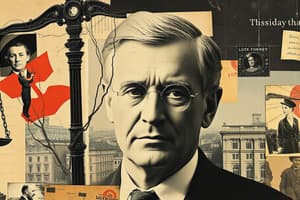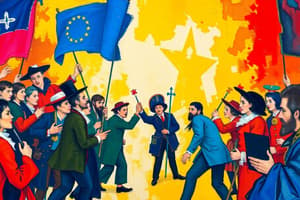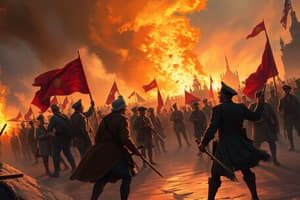Podcast
Questions and Answers
Quel est l'effet de la politique linguistique allemande sur les Cachoubes?
Quel est l'effet de la politique linguistique allemande sur les Cachoubes?
- Ils se rapprochent de l'identité polonaise.
- Ils abandonnent complètement leur langue.
- Ils sont encouragés à s'assimiler à la culture allemande. (correct)
- Ils commencent à avoir plus d'enfants que les Allemands.
Quel écrivain propose la base de l'italien moderne au XIXe siècle?
Quel écrivain propose la base de l'italien moderne au XIXe siècle?
- Manzoni (correct)
- Petrarca
- Boccace
- Dante
Quel taux de scolarisation était observé en Italie en 1900?
Quel taux de scolarisation était observé en Italie en 1900?
- 70 %
- 80 %
- 50 % (correct)
- 30 %
Qu'est-ce qui a été mis en place pour améliorer l'éducation en Italie?
Qu'est-ce qui a été mis en place pour améliorer l'éducation en Italie?
Quel était le taux d'instruction en Italie au moment de la création de l'Italie en 1861?
Quel était le taux d'instruction en Italie au moment de la création de l'Italie en 1861?
Quel facteur a contribué à l'évolution de la langue italienne au début du XXe siècle?
Quel facteur a contribué à l'évolution de la langue italienne au début du XXe siècle?
Pourquoi la mise en œuvre de l'obligation scolaire était-elle difficile en Italie?
Pourquoi la mise en œuvre de l'obligation scolaire était-elle difficile en Italie?
Comment étaient les différentes variantes de l'italien au XIXe siècle?
Comment étaient les différentes variantes de l'italien au XIXe siècle?
Quel impact a la peur du changement sur les réformes politiques aux États-Unis ?
Quel impact a la peur du changement sur les réformes politiques aux États-Unis ?
Quel est l'effet du système majoritaire sur le pouvoir au sein des partis ?
Quel est l'effet du système majoritaire sur le pouvoir au sein des partis ?
Quelle pratique électorale vise à changer délibérément les résultats électoraux en ajustant les circonscriptions ?
Quelle pratique électorale vise à changer délibérément les résultats électoraux en ajustant les circonscriptions ?
Comment le système du collège électoral peut-il mener à des résultats controversés ?
Comment le système du collège électoral peut-il mener à des résultats controversés ?
Quelle conséquence peut avoir la nomination à vie des juges de la Cour suprême ?
Quelle conséquence peut avoir la nomination à vie des juges de la Cour suprême ?
Quel est le principal problème lié au bicaméralisme du Congrès américain ?
Quel est le principal problème lié au bicaméralisme du Congrès américain ?
Comment les primaires influencent-elles le choix des candidats dans un système majoritaire ?
Comment les primaires influencent-elles le choix des candidats dans un système majoritaire ?
Quelle a été l'influence des primaires lors des élections de 2020 comparées à celles de 2016 ?
Quelle a été l'influence des primaires lors des élections de 2020 comparées à celles de 2016 ?
Quel était le principal objectif de Jacob Grim en ce qui concerne l'idée d'un État-nation allemand ?
Quel était le principal objectif de Jacob Grim en ce qui concerne l'idée d'un État-nation allemand ?
Quel rôle Napoléon joua-t-il au début du XIXe siècle concernant la langue française et le monde slave ?
Quel rôle Napoléon joua-t-il au début du XIXe siècle concernant la langue française et le monde slave ?
Comment les religions influencent-elles la division entre les Slaves ?
Comment les religions influencent-elles la division entre les Slaves ?
Quelle a été la conséquence de la division des Slaves entre le nord et le sud ?
Quelle a été la conséquence de la division des Slaves entre le nord et le sud ?
Comment le Luxembourg a-t-il réagi à l'influence allemande pendant la guerre 40-45 ?
Comment le Luxembourg a-t-il réagi à l'influence allemande pendant la guerre 40-45 ?
Quel était l'avenir de la langue suisse allemande par rapport aux autres langues ?
Quel était l'avenir de la langue suisse allemande par rapport aux autres langues ?
Quel impact Atatürk a-t-il eu sur la langue turque ?
Quel impact Atatürk a-t-il eu sur la langue turque ?
Quelle stratégie d'unification des Slaves a échoué en Pologne ?
Quelle stratégie d'unification des Slaves a échoué en Pologne ?
Quelle réforme de Jules Ferry a été mise en place pour remédier à un manque de connaissance en français chez les soldats ?
Quelle réforme de Jules Ferry a été mise en place pour remédier à un manque de connaissance en français chez les soldats ?
Quel effet l'école de Jules Ferry a-t-elle eu sur la population rurale ?
Quel effet l'école de Jules Ferry a-t-elle eu sur la population rurale ?
Quelle était la langue d'enseignement dans les départements français sous le Second Empire ?
Quelle était la langue d'enseignement dans les départements français sous le Second Empire ?
Quelle méthode répressive était utilisée dans les écoles pour réprimer les langues régionales ?
Quelle méthode répressive était utilisée dans les écoles pour réprimer les langues régionales ?
Comment l'Empire austro-hongrois a-t-il géré sa diversité linguistique dans l'éducation ?
Comment l'Empire austro-hongrois a-t-il géré sa diversité linguistique dans l'éducation ?
Quelle critique est souvent formulée contre le modèle républicain d'éducation instauré par Jules Ferry ?
Quelle critique est souvent formulée contre le modèle républicain d'éducation instauré par Jules Ferry ?
Quelle conséquence a eu l'absence d'élites utilisant des langues régionales en France ?
Quelle conséquence a eu l'absence d'élites utilisant des langues régionales en France ?
Quelle était la situation éducative de la France comparée à d'autres pays avant les réformes de Jules Ferry ?
Quelle était la situation éducative de la France comparée à d'autres pays avant les réformes de Jules Ferry ?
Quel était l'objectif principal des écoles secondaires catholiques au XVIIIe siècle?
Quel était l'objectif principal des écoles secondaires catholiques au XVIIIe siècle?
Quelle langue Adamantios Korais souhaitait-il moderniser?
Quelle langue Adamantios Korais souhaitait-il moderniser?
Quel mouvement s'oppose au 'romaique' au début du XIXe siècle?
Quel mouvement s'oppose au 'romaique' au début du XIXe siècle?
Quelle est la langue qui a été rejetée par la majorité au XIXe siècle en faveur du grec démotique?
Quelle est la langue qui a été rejetée par la majorité au XIXe siècle en faveur du grec démotique?
Quel aspect des Grecques contemporains était idéalisé au XIXe siècle?
Quel aspect des Grecques contemporains était idéalisé au XIXe siècle?
Quel conflit linguistique est survenu en Grèce au XIXe siècle?
Quel conflit linguistique est survenu en Grèce au XIXe siècle?
Qui est considéré comme le père fondateur du sionisme?
Qui est considéré comme le père fondateur du sionisme?
Quel était le principal défi auquel était confronté le patriarche orthodoxe concernant la langue?
Quel était le principal défi auquel était confronté le patriarche orthodoxe concernant la langue?
Quel est le rôle de Ben Yehuda dans le contexte de l'hébreu moderne?
Quel est le rôle de Ben Yehuda dans le contexte de l'hébreu moderne?
Comment l'hébreu a-t-il été choisi comme langue nationale?
Comment l'hébreu a-t-il été choisi comme langue nationale?
Quelles langues officielles émergent en Norvège après son indépendance?
Quelles langues officielles émergent en Norvège après son indépendance?
Quel est l'objectif principal d'Eliezer Zamenhof avec l'espéranto?
Quel est l'objectif principal d'Eliezer Zamenhof avec l'espéranto?
Quel est le fonctionnement de l'Académie Française?
Quel est le fonctionnement de l'Académie Française?
Quelles tensions le compromis linguistique autour de l'hébreu a-t-il permis d'éviter?
Quelles tensions le compromis linguistique autour de l'hébreu a-t-il permis d'éviter?
Quelle affirmation est correcte concernant la langue officielle d'Israël en 1948?
Quelle affirmation est correcte concernant la langue officielle d'Israël en 1948?
Comment pourrait-on décrire le modèle de gouvernance linguistique mentionné?
Comment pourrait-on décrire le modèle de gouvernance linguistique mentionné?
Flashcards
Gerrymandering Électorale
Gerrymandering Électorale
Une pratique consistant à manipuler les limites des circonscriptions électorales pour favoriser un parti politique ou un groupe particulier.
Système majoritaire
Système majoritaire
Système électoral où le candidat qui obtient le plus de voix gagne.
Système proportionnel
Système proportionnel
Système électoral où les sièges sont attribués aux partis en proportion des voix obtenues.
Collège électoral
Collège électoral
Signup and view all the flashcards
Bicamérisme
Bicamérisme
Signup and view all the flashcards
Nomination des juges
Nomination des juges
Signup and view all the flashcards
Primaires
Primaires
Signup and view all the flashcards
Influence disproportionnée des petites populations
Influence disproportionnée des petites populations
Signup and view all the flashcards
Écoles de Jules Ferry
Écoles de Jules Ferry
Signup and view all the flashcards
L'objectif des écoles de Jules Ferry
L'objectif des écoles de Jules Ferry
Signup and view all the flashcards
Conséquences des écoles de Jules Ferry
Conséquences des écoles de Jules Ferry
Signup and view all the flashcards
Critiques des écoles de Jules Ferry
Critiques des écoles de Jules Ferry
Signup and view all the flashcards
L'Empire austro-hongrois
L'Empire austro-hongrois
Signup and view all the flashcards
Système éducatif austro-hongrois
Système éducatif austro-hongrois
Signup and view all the flashcards
Différence entre France et Autriche-Hongrie
Différence entre France et Autriche-Hongrie
Signup and view all the flashcards
L'école comme ascenseur social
L'école comme ascenseur social
Signup and view all the flashcards
Langue cachoube
Langue cachoube
Signup and view all the flashcards
Nationalisation des masses
Nationalisation des masses
Signup and view all the flashcards
Unification linguistique
Unification linguistique
Signup and view all the flashcards
Standardisation de l'italien
Standardisation de l'italien
Signup and view all the flashcards
Développement de l'Italie
Développement de l'Italie
Signup and view all the flashcards
Le rôle de l'école
Le rôle de l'école
Signup and view all the flashcards
L'émigration italienne
L'émigration italienne
Signup and view all the flashcards
Le rôle des migrants
Le rôle des migrants
Signup and view all the flashcards
Jacob Grimm et l'idée d'une Allemagne unie
Jacob Grimm et l'idée d'une Allemagne unie
Signup and view all the flashcards
Opposition aux projets d'unification slave
Opposition aux projets d'unification slave
Signup and view all the flashcards
Langue et identité slave
Langue et identité slave
Signup and view all the flashcards
Langues germanophones et la pression d'assimilation germanique
Langues germanophones et la pression d'assimilation germanique
Signup and view all the flashcards
Atatürk et l'identité turque
Atatürk et l'identité turque
Signup and view all the flashcards
Le Congres de Vienne et les Etats Allemands
Le Congres de Vienne et les Etats Allemands
Signup and view all the flashcards
Influence Révolution française dans l'Allemagne
Influence Révolution française dans l'Allemagne
Signup and view all the flashcards
Influence Napoleon sur les langues
Influence Napoleon sur les langues
Signup and view all the flashcards
Hébreu moderne
Hébreu moderne
Signup and view all the flashcards
Projet sioniste
Projet sioniste
Signup and view all the flashcards
Espéranto
Espéranto
Signup and view all the flashcards
Bokmål et Nynorsk
Bokmål et Nynorsk
Signup and view all the flashcards
Standardisation linguistique
Standardisation linguistique
Signup and view all the flashcards
Académie Française
Académie Française
Signup and view all the flashcards
Impérialisme linguistique
Impérialisme linguistique
Signup and view all the flashcards
Servilité linguistique
Servilité linguistique
Signup and view all the flashcards
L'hélénisme moderne
L'hélénisme moderne
Signup and view all the flashcards
Adamantios Korais
Adamantios Korais
Signup and view all the flashcards
La langue pure de Korais
La langue pure de Korais
Signup and view all the flashcards
Le diletiki
Le diletiki
Signup and view all the flashcards
Théodore Herzl
Théodore Herzl
Signup and view all the flashcards
Study Notes
Introduction
- A pivotal epistemological shift occurred in Europe around 1492, moving from divine knowledge to a reliance on scientific methods.
- This shift marked a socio-economic change, moving from an agricultural system ruled by lords to a centralized royal power.
- The 1789 French Revolution was a response to prolonged wars and a crisis in the French monarchy.
- The Estates-General was convened, resulting in the declaration of the people as sovereign.
Jean-Jacques Rousseau's Social Contract
- Rousseau rejected the divine right of kings, proposing that political authority stems from social agreement and collective consent.
- He argued for a social contract, emphasizing the importance of a unified will.
- Rousseau acknowledged the practical difficulties of direct citizen participation, highlighting the need for representation.
Unification of France Post-Revolution
- The French Revolution aimed to establish uniformity among various regions and kingdoms.
- It facilitated the creation of consistent administrative divisions and equal citizenship rights.
- The goal was to solidify French identity and sovereignty.
Challenges of Popular Sovereignty
- Rousseau noted the inherent difficulty in reaching collective decisions across broad populations.
- The pre-revolutionary social hierarchy hindered true equality.
- The revolution sought to achieve a theoretical equality rather than achieve immediate practical equality.
Populism and Revolutionary Paternalism
- Revolutionary ideals struggled to reach rural populations due to local elites' influence.
- The revolutionary leaders, often from the bourgeoisie, exerted a paternalistic approach, believing they knew what was best for the populace.
- Colonization attempts were justified on the grounds of superiority in enlightenment thought.
- Thus there was a delay in political equality due to the perception of revolutionary elites as superior.
Representative Democracy
- Montesquieu advocated for a system where the people's power was delegated through elected representatives to manage the government.
- Guizot reinforced the concept of elected elites, proposing that well-educated individuals should manage public affairs.
- The potential for a "republic of judges" arose from an overly codified legal system, granting a potentially unchecked bureaucratic power.
Revolutionary and Napoleonic Referendums
- The 1793 Constitution allowed for popular uprisings against the government. It also included many rights for citizens.
- The 1795 Constitution restricted positive rights and experienced low voter turnout.
- Napoleon used referendums to consolidate power, accumulating support for his reign.
- Referendums were not always popular with the populace during this time.
Bicameralism and the Electoral College
- The United States' bicameral legislature, with its Senate (two representatives per state) and House of Representatives (proportional to population).
- The U.S. Electoral College is a system where electors, not the direct popular vote, decide the presidential candidate.
- Primary elections allow voters to choose a candidate for a political party.
Forms of Democracy
- Rousseau recognised the inadequacy of direct democracy, proposing representative systems instead.
- The French Revolution displayed a complex series of governmental forms.
Language and Governance
- Multilingualism coexisted with unilingualism, particularly across communities within countries.
- Vernacular languages (dialects) were distinct from official languages.
- Linguistic diversity often reflected social differences.
- Standardization of languages was a key factor in nation building
- Attempts to unify language with the state, particularly in France, met with varied success.
The Role of Education
- The French Revolution emphasized the importance of public education to unify the country.
- Educational development in other European countries has followed similar trajectories.
- The success of education in creating a unified national identity was limited and uneven.
The Rise of National Identity
- The rise of national languages and educational programs marked a significant shift.
- The emergence of the nation-state created a need for a unifying language.
- The desire for unifying languages sometimes conflicted with local traditions.
Studying That Suits You
Use AI to generate personalized quizzes and flashcards to suit your learning preferences.
Related Documents
Description
Ce quiz explore les changements épistémologiques en Europe autour de 1492, ainsi que les idées de Jean-Jacques Rousseau sur le contrat social. Il examine également les conséquences de la Révolution française sur l'unification des régions et le pouvoir royal. Testez vos connaissances sur cette période charnière de l'histoire française.




